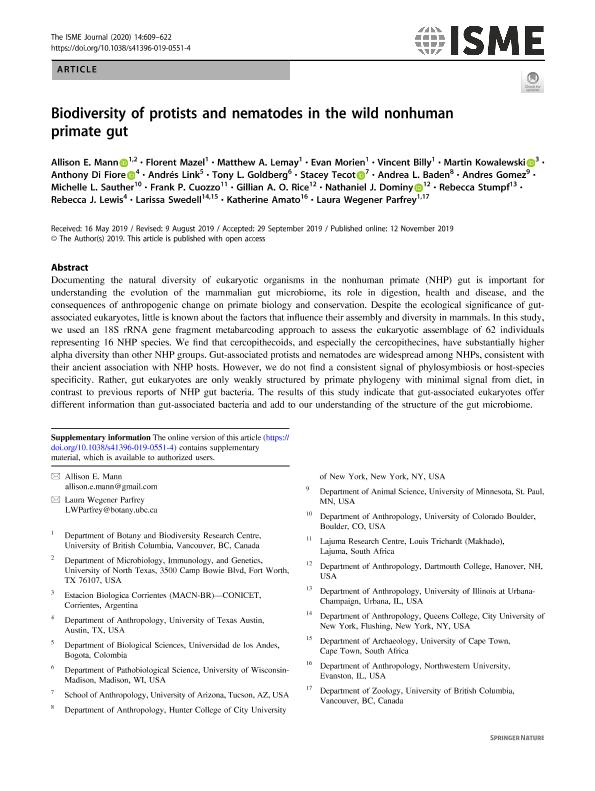Artículo
Biodiversity of protists and nematodes in the wild nonhuman primate gut
Mann, Allison E.; Mazel, Florent; Lemay, Matthew A.; Morien, Evan; Billy, Vincent; Kowalewski, Miguel Martin ; Di Fiore, Anthony; Link, Andrés; Goldberg, Tony L.; Tecot, Stacey; Baden, Andrea L.; Gomez, Andres; Sauther, Michelle L.; Cuozzo, Frank P.; Rice, Gillian A. O.; Dominy, Nathaniel J.; Stumpf, Rebecca; Lewis, Rebecca J.; Swedell, Larissa; Amato, Katherine; Wegener Parfrey, Laura
; Di Fiore, Anthony; Link, Andrés; Goldberg, Tony L.; Tecot, Stacey; Baden, Andrea L.; Gomez, Andres; Sauther, Michelle L.; Cuozzo, Frank P.; Rice, Gillian A. O.; Dominy, Nathaniel J.; Stumpf, Rebecca; Lewis, Rebecca J.; Swedell, Larissa; Amato, Katherine; Wegener Parfrey, Laura
 ; Di Fiore, Anthony; Link, Andrés; Goldberg, Tony L.; Tecot, Stacey; Baden, Andrea L.; Gomez, Andres; Sauther, Michelle L.; Cuozzo, Frank P.; Rice, Gillian A. O.; Dominy, Nathaniel J.; Stumpf, Rebecca; Lewis, Rebecca J.; Swedell, Larissa; Amato, Katherine; Wegener Parfrey, Laura
; Di Fiore, Anthony; Link, Andrés; Goldberg, Tony L.; Tecot, Stacey; Baden, Andrea L.; Gomez, Andres; Sauther, Michelle L.; Cuozzo, Frank P.; Rice, Gillian A. O.; Dominy, Nathaniel J.; Stumpf, Rebecca; Lewis, Rebecca J.; Swedell, Larissa; Amato, Katherine; Wegener Parfrey, Laura
Fecha de publicación:
11/2019
Editorial:
Nature Publishing Group
Revista:
Isme Journal
ISSN:
1751-7362
e-ISSN:
1751-7362
Idioma:
Inglés
Tipo de recurso:
Artículo publicado
Clasificación temática:
Resumen
Documenting the natural diversity of eukaryotic organisms in the nonhuman primate (NHP) gut is important for understanding the evolution of the mammalian gut microbiome, its role in digestion, health and disease, and the consequences of anthropogenic change on primate biology and conservation. Despite the ecological significance of gut-associated eukaryotes, little is known about the factors that influence their assembly and diversity in mammals. In this study, we used an 18S rRNA gene fragment metabarcoding approach to assess the eukaryotic assemblage of 62 individuals representing 16 NHP species. We find that cercopithecoids, and especially the cercopithecines, have substantially higher alpha diversity than other NHP groups. Gut-associated protists and nematodes are widespread among NHPs, consistent with their ancient association with NHP hosts. However, we do not find a consistent signal of phylosymbiosis or host-species specificity. Rather, gut eukaryotes are only weakly structured by primate phylogeny with minimal signal from diet, in contrast to previous reports of NHP gut bacteria. The results of this study indicate that gut-associated eukaryotes offer different information than gut-associated bacteria and add to our understanding of the structure of the gut microbiome.
Palabras clave:
MICROBIOME
,
GUT MICROBIOLOGY
,
DIGESTION
,
BACTERIA
Archivos asociados
Licencia
Identificadores
Colecciones
Articulos(CCT - NORDESTE)
Articulos de CTRO.CIENTIFICO TECNOL.CONICET - NORDESTE
Articulos de CTRO.CIENTIFICO TECNOL.CONICET - NORDESTE
Citación
Mann, Allison E.; Mazel, Florent; Lemay, Matthew A.; Morien, Evan; Billy, Vincent; et al.; Biodiversity of protists and nematodes in the wild nonhuman primate gut; Nature Publishing Group; Isme Journal; 14; 2; 11-2019; 609-622
Compartir
Altmétricas



